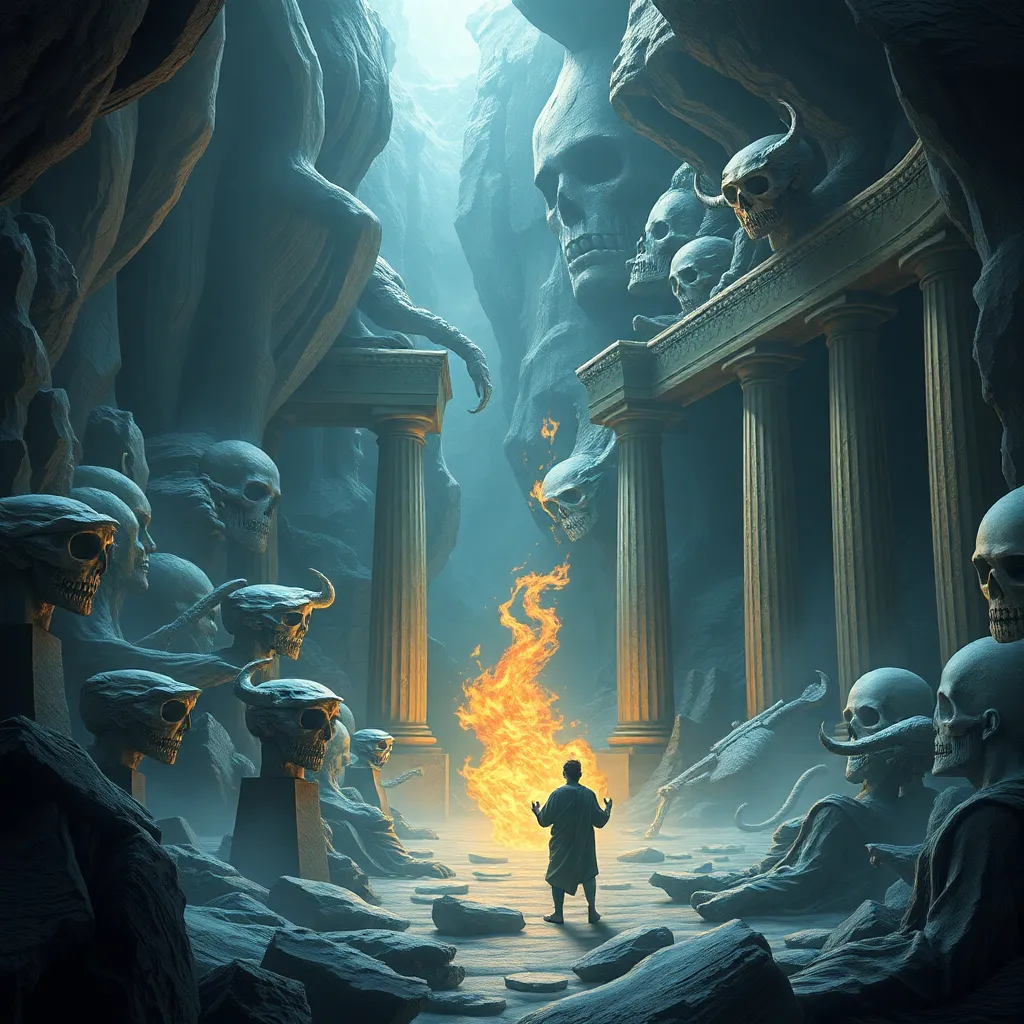Odysseus’s Encounter with the Underworld: Lessons from the Dead
I. Introduction
Homer’s epic poem, The Odyssey, chronicles the arduous journey of Odysseus as he strives to return home after the Trojan War. His voyage is fraught with challenges, but one of the most significant episodes occurs during his descent into the Underworld. This encounter serves not only as a pivotal moment in the narrative but also offers profound insights into the human condition through the lessons imparted by the dead.
This article aims to explore the significance of Odysseus’s encounter with the Underworld, examining the lessons he learns from the spirits of the deceased and how these insights shape his character and destiny.
II. Context of the Underworld in Greek Mythology
The Underworld, known as Hades, is a realm in Greek mythology where the souls of the deceased reside. It is often depicted as a shadowy and complex place, governed by Hades, the god of the dead. Inhabited by various shades of the departed, the Underworld is populated by figures ranging from ordinary souls to legendary heroes.
In ancient Greek beliefs, the dead played a significant role in the moral and spiritual fabric of society. They were seen as guardians of the values and lessons of the past, providing guidance to the living. The importance of the Underworld in Odysseus’s journey cannot be overstated, as it serves as a turning point that shapes his understanding of life, death, and legacy.
III. Odysseus’s Descent: Setting the Stage
Odysseus’s descent into the Underworld is precipitated by a series of events that highlight his need for knowledge and guidance. After leaving the island of Circe, where he learns of the necessity to consult the blind prophet Teiresias, Odysseus prepares for this dark journey. He performs rituals, including the sacrifice of animals, to appease the spirits and gain their wisdom.
The journey into the Underworld symbolizes a confrontation with darkness—both literally and metaphorically. It represents Odysseus’s willingness to face the unknown and seek understanding from those who have experienced death.
IV. Encounters with Key Figures
During his time in the Underworld, Odysseus encounters several key figures whose stories impart crucial lessons:
A. Teiresias: The Blind Prophet’s Guidance
Teiresias, despite his blindness, possesses profound insight into the future and the human condition. His prophecies include:
- The warning of the dangers that await Odysseus on his journey home.
- The necessity of honoring the gods and making sacrifices upon his return.
Teiresias teaches Odysseus about the balance between fate and free will, illustrating that while destiny may set the stage, individual choices ultimately steer the course of life.
B. Agamemnon: The Fallen Hero’s Tale
Odysseus meets Agamemnon, the former king of Mycenae, who recounts his tragic fate. Agamemnon’s story is laden with themes of betrayal and loyalty, particularly in relation to his wife, Clytemnestra, who plotted his murder. Key reflections include:
- Agamemnon’s lament over his failure to trust his allies.
- The poignant reminder of the fleeting nature of glory and the burdens of leadership.
This encounter prompts Odysseus to reflect on his own relationships and the importance of loyalty and vigilance in leadership.
C. Achilles: The Hero’s Perspective on Mortality
Odysseus’s encounter with Achilles, the greatest warrior of the Trojan War, offers profound insights into heroism and mortality. Achilles expresses regret over his choice of glory at the expense of a long, peaceful life. His insights include:
- The paradox of seeking glory and the suffering that often accompanies it.
- The realization that even the greatest heroes are ultimately subject to fate and death.
Achilles’s perspective challenges Odysseus to reconsider the nature of heroism and the legacy he wishes to leave behind.
V. Thematic Lessons from the Dead
The encounters in the Underworld present several thematic lessons that resonate throughout Odysseus’s journey:
- The Inevitability of Death: The Underworld serves as a reminder that death is an inescapable part of life, emphasizing the importance of legacy.
- The Value of Humility: The lessons from the dead teach Odysseus the need for self-awareness and humility in the face of greater powers.
- Understanding Consequences: Each character’s fate underscores the consequences of choices made during life, urging Odysseus to reflect on his own decisions.
VI. The Influence of the Encounter on Odysseus
The encounter with the dead profoundly transforms Odysseus. He emerges from the Underworld with a deeper understanding of his identity and purpose. Key changes include:
- Character Transformation: Odysseus becomes more introspective, contemplating the weight of leadership and the responsibilities it entails.
- Approach to Leadership: His experiences lead him to prioritize loyalty and wisdom over mere cunning.
- Enduring Impact: The lessons learned from the dead shape his approach as he navigates the challenges of returning home, instilling in him a newfound sense of purpose.
VII. Modern Interpretations and Relevance
Odysseus’s journey into the Underworld continues to resonate with contemporary audiences, offering valuable lessons for modern life:
- Facing Fears: The journey symbolizes the necessity of confronting one’s fears and mortality to grow and learn.
- Legacy and Impact: It encourages individuals to consider the legacy they wish to leave behind, both personally and socially.
- Human Experience: Odysseus’s struggles serve as a reminder of the timeless nature of human challenges and the search for meaning.
VIII. Conclusion
Odysseus’s encounter with the Underworld is a rich tapestry of lessons from the dead, revealing profound truths about life, death, and the human experience. As he learns from figures like Teiresias, Agamemnon, and Achilles, he gains insights that shape his character and future choices.
The enduring legacy of The Odyssey lies in its ability to illuminate the complexities of the human journey. By confronting the past and the lessons it offers, Odysseus not only shapes his destiny but also provides timeless wisdom for future generations.




